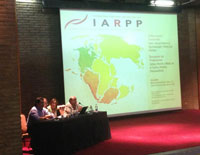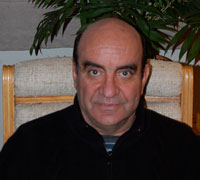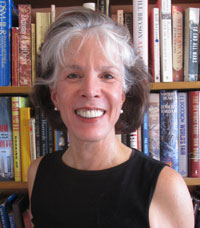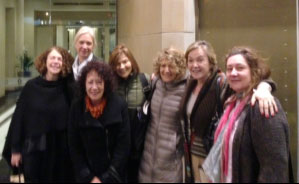Juan Francisco Jordan-Moore (Chile)
Conference Co-Chair
Three months after the termination of the 11th International Conference, the title, “Meeting of Traditions: Field, Link and Matrix in Psychoanalytic Theory and Practice” may be a good start to make a remembrance of the event. When we started we had the purpose of a meeting, not only of different theoretical perspectives and approaches to psychoanalytic practice, but also the aspiration to accomplish a reunion of the languages that sustain the Relational and Latin American traditions of psychoanalysis, English and Spanish. As my commentary will address, the experience that finally emerged in the Conference was an emotional meeting that surpassed all of our expectations.
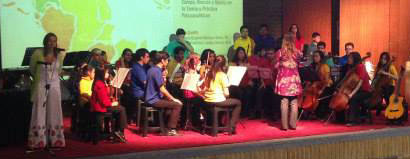 In the Opening Ceremony a chorus and orchestra of children from Santa Cruz sang a variety of songs, among which it was specially moving to hear “Luchín”, a song by Victor Jara, and “Sube a Nacer Conmigo Hermano”, music by “Los Jaivas” of a Neruda’s text from “Las Alturas de Machu-Pichu”. This musical opening was perhaps the announcement of what was going to transpire during the Conference. This orchestra and chorus is now one of a number of children assemblies through Chile and Latin America. It is part of an organization of musical orchestras of children that was founded by Jorge Peña Hen, a Chilean musician who was murdered on October 16, 1973 by the dreadful “Death Caravan”, after the September 11 coup by Pinochet in Chile. So here we had death and trauma flowing from the past to meet the present through life capable of renewing itself in the beauty of songs that do not forget the horrors of the past.
In the Opening Ceremony a chorus and orchestra of children from Santa Cruz sang a variety of songs, among which it was specially moving to hear “Luchín”, a song by Victor Jara, and “Sube a Nacer Conmigo Hermano”, music by “Los Jaivas” of a Neruda’s text from “Las Alturas de Machu-Pichu”. This musical opening was perhaps the announcement of what was going to transpire during the Conference. This orchestra and chorus is now one of a number of children assemblies through Chile and Latin America. It is part of an organization of musical orchestras of children that was founded by Jorge Peña Hen, a Chilean musician who was murdered on October 16, 1973 by the dreadful “Death Caravan”, after the September 11 coup by Pinochet in Chile. So here we had death and trauma flowing from the past to meet the present through life capable of renewing itself in the beauty of songs that do not forget the horrors of the past.
The Opening Panel was dedicated to the indigenous people of Chile. One of the panelists was Pedro Cayuqueo a Mapuche journalist who has written extensively about the oblivion of the Mapuche culture by the dominant culture of the Chileans and the violations of their human rights. He spoke to us in Mapudungun, the language of the Mapuches, making us all aware of the importance of speaking the other´s language as a basis for mutual recognition. To my mind this was a remarkable signal of the place that Relational Psychoanalysis can inhabit in the social tapestry of our time; a remembrance that psychoanalysis lives and thinks mostly in the borders, looking at the disenfranchised and, thus, it is capable of rescuing that which is human and yet is excluded form the speech of power. Wasn’t this the case with sexuality in the beginning?
 I witnessed during the following days a growing emotional intimacy in the participants that maybe was also facilitated by the fact that the Paper Sessions took place in rooms that surrounded a central plaza in which we all gathered to have coffee and some cookies during the breaks. You could see from the balcony of the second floor all of us people talking to each other and could sense the enthusiasm of something that was unexpected and a surprise. I followed the presentations that spoke of trauma from socio-political causes and people could open their emotional intimacy to others who were really listening. This happened between people who didn´t speak the same language. The experience of emotions as a universal medium of communicating is so compelling. We really could have a bi-lingual Conference a challenge we thought we could not accomplish.
I witnessed during the following days a growing emotional intimacy in the participants that maybe was also facilitated by the fact that the Paper Sessions took place in rooms that surrounded a central plaza in which we all gathered to have coffee and some cookies during the breaks. You could see from the balcony of the second floor all of us people talking to each other and could sense the enthusiasm of something that was unexpected and a surprise. I followed the presentations that spoke of trauma from socio-political causes and people could open their emotional intimacy to others who were really listening. This happened between people who didn´t speak the same language. The experience of emotions as a universal medium of communicating is so compelling. We really could have a bi-lingual Conference a challenge we thought we could not accomplish.
Finally my question is: Did we really meet? Was there really a meeting of traditions? As I said in the concluding session I think both traditions really met in an absence that was represented in the gap between the different continents gathering as to form again Pangea, the logo of the Conference. This empty space emphasizes the absence of a unified theory that can give a full account of human suffering due to trauma. The Conference could not have seen the light of day had it not been for all the living relational community that contributed to this event for which I am very grateful. In the end all I can say is a humble prayer to life.
“Gracias a la Vida.”
Looking forward to meet many of you again in Toronto,

